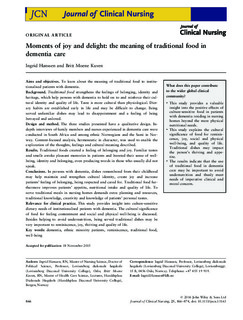| dc.description.abstract | Aims and objectives: To learn about the meaning of traditional food to institutionalised patients with dementia.
Background: Traditional food strengthens the feelings of belonging, identity and heritage, which help persons with dementia to hold on to and reinforce their cultural identity and quality of life. Taste is more cultural than physiological. Dietary habits are established early in life and may be difficult to change. Being served unfamiliar dishes may lead to disappointment and a feeling of being betrayed and unloved.
Design and method: The three studies presented have a qualitative design. In-depth interviews of family members and nurses experienced in dementia care were conducted in South Africa and among ethnic Norwegians and the Sami in Norway. Content-focused analysis, hermeneutic in character, was used to enable the exploration of the thoughts, feelings and cultural meaning described.
Results: Traditional foods created a feeling of belonging and joy. Familiar tastes and smells awoke pleasant memories in patients and boosted their sense of well-being, identity and belonging, even producing words in those who usually did not speak.
Conclusions: In persons with dementia, dishes remembered from their childhood may help maintain and strengthen cultural identity, create joy and increase patients' feeling of belonging, being respected and cared for. Traditional food furthermore improves patients' appetite, nutritional intake and quality of life. To serve traditional meals in nursing homes demands extra planning and resources, traditional knowledge, creativity and knowledge of patients' personal tastes.
Relevance for clinical practice: This study provides insight into culture-sensitive dietary needs of institutionalised patients with dementia. The cultural significance of food for feeling contentment and social and physical well-being is discussed. Besides helping to avoid undernutrition, being served traditional dishes may be very important to reminiscence, joy, thriving and quality of life. | nb_NO |
